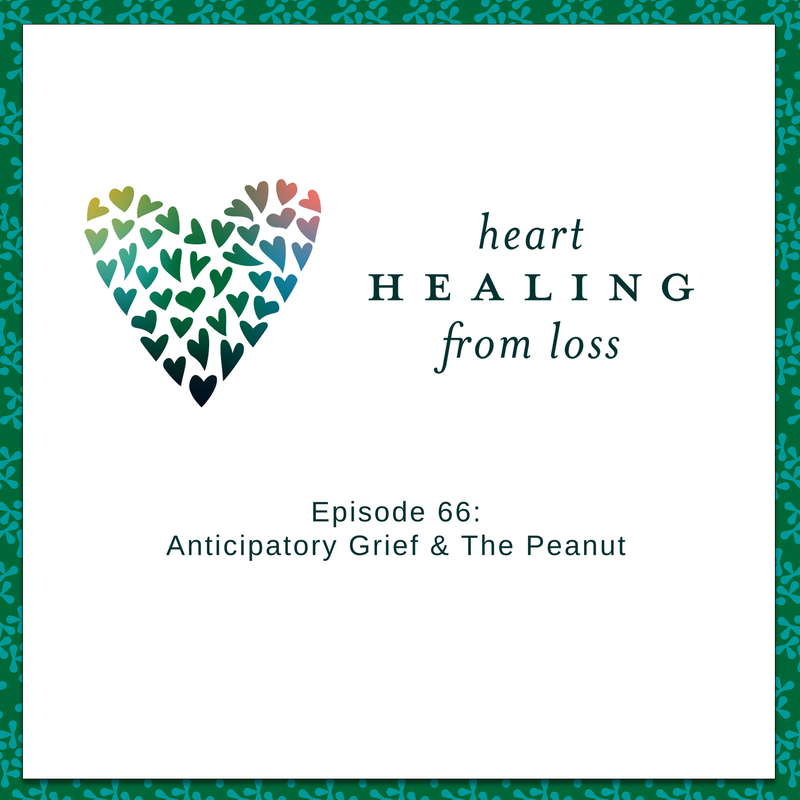Episode 66: Anticipatory Grief & The Peanut
|
Today Wendy Sloneker, Grief Coach & Specialist, explains Anticipatory Grief. These are the thoughts and fears about something specific that might be coming or changing, such as a medical diagnosis, a loved one or pet that starts to physically or mentally decline, or the noticing of incremental loss (tangible or intangible).
There’s a little part of her brain Wendy calls “The Peanut.” She describes it as the part of her brain that protects her by helping her anticipate and prepare for the coming grief-causing event. The Peanut becomes heighted in moments of anticipating a future event – and even the anticipation before the grief can be unsettling. Anticipating future events can take us out of the moment, away from what’s actually happening now in our lives, robbing us of life’s moments. So, Wendy follows up with some tips and ideas of how to feel “normal” when your “Peanut” is causing some big feelings or some anxiety. |
You are Invited:
If you would like to learn more about navigating grief and loss, or find support by working with Wendy, visit her website: www.wendysloneker.com.
And if you are interested in Wendy’s group coaching program, Going Inside, find more information at goinginside.me.
If you would like to learn more about navigating grief and loss, or find support by working with Wendy, visit her website: www.wendysloneker.com.
And if you are interested in Wendy’s group coaching program, Going Inside, find more information at goinginside.me.
As seen on: |
|
Full Episode Transcript
Wendy Sloneker
You are listening to the Heart Healing from Loss podcast with Wendy Sloneker. This is episode 66. I welcome back, I'm glad you're here. I've been speaking with more than one person about anticipatory grief. And while it's not a fun conversation, I want to kind of normalize and give a little bit of context for it. Because it is a natural, normal part of human brain function. I'm going to do this by way of making an introduction to a little part of my brain that I call the peanut, you are welcome to call yours, something else like the pistachio if you're allergic, I fully understand. And let's get into it.
So, first, what is anticipatory grief? Well, oftentimes, what happens in life is there's a change of some kind a diagnosis, or a one of the first things that that I noticed about anticipatory grief for me personally, was when I was noticing my beloved wiener dog aging. So he was getting to be a grumpy old man who I loved. But I noticed that things were changing, like his hearing was going, he wasn't waking up to greet me at the door anymore, he was waiting until I got to wake him up and say, Hello, when I reached the couch in the home, that sort of thing.
So I was noticing that his abilities were changing his life was changing these kinds of things. And so these are known as incremental changes as, as a body ages and prepares for, you know, an exit from the planet. And so while this is a natural function, it is also not fun, it is not a pleasure, and it can be really scary. So anticipatory grief, in this instance, is when I'm noticing something about something specific. This also happened to me when, you know, I would, well, I'm getting ahead of myself already right there. So while shoot, what I was gonna say is one I was making dietary changes, and also quitting drinking. There was a lot of feelings and thoughts that came up in that same peanut kind of part of my brain that was wondering like, how it was going to be what was going to happen next. These are things that drove anxiety, future tripping, but also that part of my brain is there for a reason.
It's trying to protect myself, trying to help me prepare for things that are not in this moment. The life that may or may not be coming, that I don't know exactly how it's going to play out. So the thing about anticipatory grief, which is often having to do with something specific, either that change in life or medical diagnosis, or a noticing of incremental loss, whether it's tangible loss or intangible loss, like you can have anticipatory grief over an intangible loss, like a loss of trust, like incremental losses of trust will lead to more loss of trust, and this can This is grief worthy, this is something that, you know, our relationship may be changing. So, I want to normalize that more than anything else. You know, when we think about that, the thoughts when we think about thoughts, that's so like, getting into it right there.
But when we observe thoughts, or when we think about our thinking, it can really take us out of the moment. So the future tripping and the anticipate the anticipation anyway, that is what's going to happen and largely what I'm saying is like this spike in anxiety around it. Now, remember, this is not the life that we have at the moment. This is our thoughts and fears about it. Created by that little peanut part of my brain. I call it a peanut. Why do I call it that? Well, I'm not allergic and so peanuts are not, you know, particularly dangerous to me. Like I said, pistachio, cashew whatever you're not allergic to that's little econo also be you know, a frog, or a turtle or a little part of your brain that is something that you identified. This doesn't mean anything about your mental health other than you are relating to a part of your brain that is designed to avoid pain, seek pleasure. And keep things as steady familiar stable, known as possible.
This is getting more and more difficult to stay the same. But the brain that peanut part in our brain really wants to fight to, and resist to keep it familiar. This is also why we can find ourselves, talking ourselves out of the goals that we really want the experiences that we really want. This just has to do with a loud part of our brain, my peanut is pretty loud sometimes. And it's just trying to protect me. So I don't like there's no way to ever do away with this sort of voice in our heads, if you will. There's nothing wrong with it, it's just kind of heightened and active because we are afraid. And we are sensing and noticing change.
This has been happening all along. This happens in, in, in times of our lives when death is like nowhere near this happens when we don't know how we're gonna feel when we retire, we don't know how we're gonna feel when the kids grow up and move out of the house that we brought them up in this is we don't know how we're going to feel we're afraid of how we're gonna feel. We tried to prepare ourselves by trying to play out scenarios in the future, we can spend a lot of our lifetime trying to anticipate what's going to happen or not happen.
And we make a lot of like, well, I'm gonna say virtually. And this is, this is where I'm not a statistician, but I'm just gonna throw it out there. We make 99.1% of our decisions based on emotion. So our actions, I should say, we take action, or we do not take action based on our feelings and emotions. So this little peanut part of my brain has a lot to do with how I get things done or don't. When I believe that I need to, you know, avoid pain, seek pleasure, keep things exactly the same way that they are right now.
But exactly the same way that they aren't right now is not going to get me into the results that I want to experience for my own life. And this is where we have a choice like, are we willing to feel the actual way we're going to feel which we don't know what that is? Am I actually willing to be in this moment right now? And pay attention to my life that's happening right now? Or am I so scared and so charged? And like, just sad about something I'm noticing that is going to indicate further change?
What do I need to do about that right now? If anything? Do I need to spend more time with myself and a loved one? Whether it's a pet or a person? Or do I need to do I want to or need to change anything about my relationship with that person, organization? perspective on that life event? These sorts of things like you have all the choices for that.
But when we're in heightened peanut stage when the peanut is roasting, if you will, it can be hard to remember that we have choices about our life right now. And we have moments in our life right now. Being afraid of the future is something that is, you know, honest and genuine. And we do spend a lot of time there. I'm not going to judge that, because I have that. So I'm also not going to try to resist it or wait it out until it goes away because it's not.
What I am going to do is work with myself and not fight myself over something that I can't control which is that one part of my brain that has not evolved yet. I can help it evolve by being here by identifying I, oh my gosh, there's a part of my whole self that is afraid of what's going to happen.
You see how we spend so much time. This is not wrong. But I do want to point it out. Because this is also where there's an opportunity to, do things that you want to do with the life that you have right now. I'm only pointing it out, because it's also my work. So and when I say my work, this is not just my client work, this is my life work, like what kind of life do I want? It's not indefinite. But this moment? Turns out that's definite.
So I'm thinking of you. And I'm thinking of us, and I'm taking my my walk through my days. How are you doing? I'd love for you to come back next week, when I have another episode, I'm probably going to be talking about anticipatory grief for a little while, because it's such a present life. Habit for many people, and I'm not discounting that this is scary.
What I am going to offer, is that, okay, once you make a choice, and you are able to identify, I mean, let me back up. Once you identify that it's anticipatory grief. You know what I'm trying to say? Once you identify it, do you still want to do it? In that moment? You might? And I'm going to say yes. Okay, awesome. That's what you need to do great. If it's not, and you want to find something else that is meaningful, or connective, or soothing for yourself. It's only going to affect your life, your perspective and those around you in that moment. So this is where we have choices. And we're going to try to protect myself from something that may happen the way that I'm afraid it's gonna happen. Or do I want to be here?
If you're my client, you're interested in being here and not missing your life. Okay, really, truly, I was wrapping up a few minutes ago, but now I'm wrapping up. And I look forward to seeing you soon. Okay, bye.
Hey, thanks for listening. And if you are interested in doing a little deeper work in my group coaching program, go to goinginside.me See what I did there, going inside.me. That's an annual program. We can work together in a group setting. And you'll see all the details right there. love to have you join. Thank you for listening, and I'll talk to you next week.
You are listening to the Heart Healing from Loss podcast with Wendy Sloneker. This is episode 66. I welcome back, I'm glad you're here. I've been speaking with more than one person about anticipatory grief. And while it's not a fun conversation, I want to kind of normalize and give a little bit of context for it. Because it is a natural, normal part of human brain function. I'm going to do this by way of making an introduction to a little part of my brain that I call the peanut, you are welcome to call yours, something else like the pistachio if you're allergic, I fully understand. And let's get into it.
So, first, what is anticipatory grief? Well, oftentimes, what happens in life is there's a change of some kind a diagnosis, or a one of the first things that that I noticed about anticipatory grief for me personally, was when I was noticing my beloved wiener dog aging. So he was getting to be a grumpy old man who I loved. But I noticed that things were changing, like his hearing was going, he wasn't waking up to greet me at the door anymore, he was waiting until I got to wake him up and say, Hello, when I reached the couch in the home, that sort of thing.
So I was noticing that his abilities were changing his life was changing these kinds of things. And so these are known as incremental changes as, as a body ages and prepares for, you know, an exit from the planet. And so while this is a natural function, it is also not fun, it is not a pleasure, and it can be really scary. So anticipatory grief, in this instance, is when I'm noticing something about something specific. This also happened to me when, you know, I would, well, I'm getting ahead of myself already right there. So while shoot, what I was gonna say is one I was making dietary changes, and also quitting drinking. There was a lot of feelings and thoughts that came up in that same peanut kind of part of my brain that was wondering like, how it was going to be what was going to happen next. These are things that drove anxiety, future tripping, but also that part of my brain is there for a reason.
It's trying to protect myself, trying to help me prepare for things that are not in this moment. The life that may or may not be coming, that I don't know exactly how it's going to play out. So the thing about anticipatory grief, which is often having to do with something specific, either that change in life or medical diagnosis, or a noticing of incremental loss, whether it's tangible loss or intangible loss, like you can have anticipatory grief over an intangible loss, like a loss of trust, like incremental losses of trust will lead to more loss of trust, and this can This is grief worthy, this is something that, you know, our relationship may be changing. So, I want to normalize that more than anything else. You know, when we think about that, the thoughts when we think about thoughts, that's so like, getting into it right there.
But when we observe thoughts, or when we think about our thinking, it can really take us out of the moment. So the future tripping and the anticipate the anticipation anyway, that is what's going to happen and largely what I'm saying is like this spike in anxiety around it. Now, remember, this is not the life that we have at the moment. This is our thoughts and fears about it. Created by that little peanut part of my brain. I call it a peanut. Why do I call it that? Well, I'm not allergic and so peanuts are not, you know, particularly dangerous to me. Like I said, pistachio, cashew whatever you're not allergic to that's little econo also be you know, a frog, or a turtle or a little part of your brain that is something that you identified. This doesn't mean anything about your mental health other than you are relating to a part of your brain that is designed to avoid pain, seek pleasure. And keep things as steady familiar stable, known as possible.
This is getting more and more difficult to stay the same. But the brain that peanut part in our brain really wants to fight to, and resist to keep it familiar. This is also why we can find ourselves, talking ourselves out of the goals that we really want the experiences that we really want. This just has to do with a loud part of our brain, my peanut is pretty loud sometimes. And it's just trying to protect me. So I don't like there's no way to ever do away with this sort of voice in our heads, if you will. There's nothing wrong with it, it's just kind of heightened and active because we are afraid. And we are sensing and noticing change.
This has been happening all along. This happens in, in, in times of our lives when death is like nowhere near this happens when we don't know how we're gonna feel when we retire, we don't know how we're gonna feel when the kids grow up and move out of the house that we brought them up in this is we don't know how we're going to feel we're afraid of how we're gonna feel. We tried to prepare ourselves by trying to play out scenarios in the future, we can spend a lot of our lifetime trying to anticipate what's going to happen or not happen.
And we make a lot of like, well, I'm gonna say virtually. And this is, this is where I'm not a statistician, but I'm just gonna throw it out there. We make 99.1% of our decisions based on emotion. So our actions, I should say, we take action, or we do not take action based on our feelings and emotions. So this little peanut part of my brain has a lot to do with how I get things done or don't. When I believe that I need to, you know, avoid pain, seek pleasure, keep things exactly the same way that they are right now.
But exactly the same way that they aren't right now is not going to get me into the results that I want to experience for my own life. And this is where we have a choice like, are we willing to feel the actual way we're going to feel which we don't know what that is? Am I actually willing to be in this moment right now? And pay attention to my life that's happening right now? Or am I so scared and so charged? And like, just sad about something I'm noticing that is going to indicate further change?
What do I need to do about that right now? If anything? Do I need to spend more time with myself and a loved one? Whether it's a pet or a person? Or do I need to do I want to or need to change anything about my relationship with that person, organization? perspective on that life event? These sorts of things like you have all the choices for that.
But when we're in heightened peanut stage when the peanut is roasting, if you will, it can be hard to remember that we have choices about our life right now. And we have moments in our life right now. Being afraid of the future is something that is, you know, honest and genuine. And we do spend a lot of time there. I'm not going to judge that, because I have that. So I'm also not going to try to resist it or wait it out until it goes away because it's not.
What I am going to do is work with myself and not fight myself over something that I can't control which is that one part of my brain that has not evolved yet. I can help it evolve by being here by identifying I, oh my gosh, there's a part of my whole self that is afraid of what's going to happen.
You see how we spend so much time. This is not wrong. But I do want to point it out. Because this is also where there's an opportunity to, do things that you want to do with the life that you have right now. I'm only pointing it out, because it's also my work. So and when I say my work, this is not just my client work, this is my life work, like what kind of life do I want? It's not indefinite. But this moment? Turns out that's definite.
So I'm thinking of you. And I'm thinking of us, and I'm taking my my walk through my days. How are you doing? I'd love for you to come back next week, when I have another episode, I'm probably going to be talking about anticipatory grief for a little while, because it's such a present life. Habit for many people, and I'm not discounting that this is scary.
What I am going to offer, is that, okay, once you make a choice, and you are able to identify, I mean, let me back up. Once you identify that it's anticipatory grief. You know what I'm trying to say? Once you identify it, do you still want to do it? In that moment? You might? And I'm going to say yes. Okay, awesome. That's what you need to do great. If it's not, and you want to find something else that is meaningful, or connective, or soothing for yourself. It's only going to affect your life, your perspective and those around you in that moment. So this is where we have choices. And we're going to try to protect myself from something that may happen the way that I'm afraid it's gonna happen. Or do I want to be here?
If you're my client, you're interested in being here and not missing your life. Okay, really, truly, I was wrapping up a few minutes ago, but now I'm wrapping up. And I look forward to seeing you soon. Okay, bye.
Hey, thanks for listening. And if you are interested in doing a little deeper work in my group coaching program, go to goinginside.me See what I did there, going inside.me. That's an annual program. We can work together in a group setting. And you'll see all the details right there. love to have you join. Thank you for listening, and I'll talk to you next week.






